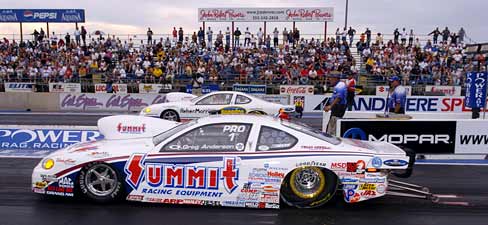|


Anderson:
There was just a whole list of things that were
going to change that I was going to have to
spend money on, build new cars and do all kind
of things. We had to change our rear end housing
and made new ones that were shorter so we could
get the tires in there. Then you couldn't get
enough wheels right away to solve that problem.
The rear end gear ratios that we ran with the
old tire combination were a real good gear.
We'd run 100 runs, take it off, and put a new
one in and we'd never have a failure and never
had a problem. With the new ratios we already
knew from sporadic testing that you weren't
going to get more than 10 or 15 runs and you
were going to start breaking them. Every drive
part was going to strain harder with a bigger,
heavier tire. I was right on the money.
As soon as we started testing down in Florida
with them we broke drive shafts, rear ends,
yokes on the back of the transmission. We broke
so many parts it was ridiculous. It wasn't that
we couldn't run faster than the other cars;
it was too much parts breakage and attrition.
That cost a lot of money and that costs races.
That's what I didn't like about it and that's
why I voiced my opinion
DRO: What's
your opinion on introducing EFI (electronic
fuel injection) to the class?
Anderson:
I think we should. I think we will and I don't
think we need to wait a whole lot longer. I
think it needs to happen, but it comes down
to the identity problem again. The last thread
we cling to is we look like a stock car, at
least more so than a Funny Car, but not with
that big scoop sitting up like that and carburetors
on it. There's no stock car built like that
anymore. We always fight for more factory support
from GM, Chrysler, Ford, and if we had EFI maybe
that would make more sense to them. You'd actually
have more parts on these cars that they sell.
Maybe a better bang for their buck.
DRO: If you're
interested in making the cars more factory-like,
would you be interested in going to a smaller
tire like a drag radial type?
Anderson:
I don't know. I don't know much about that.
I just want these cars to go faster. Don't make
them slower. Two hundred mile an hour seems
to be a magical number when you go to a race
and we just had one in Topeka where not many
cars ran over 200. It just don't look right.
You look at that score board and something just
don't look right. How many people in the grandstands
it affects, I don't know, but I just think those
speeds need to be up and that will make the
class more exciting.
DRO: Your
success has fostered suspicions of cheating.
How do you feel when competitors or media members
allude to the possibility you're somehow cheating?
Anderson:
It's not comfortable. I don't like it at all
because I've never been one of those guys that
accused people of that. When I worked for Warren
they accused him all the time because he was
winning all the time. Then, when the shoes were
on the other foot and the Wayne County Speed
Shop and Jim Yates won for years, it was somebody
else getting accused.
I never once got on that bandwagon and accused
other people. When that happened you got beat
and it just made you want to go home and work
harder and try and come out better the next
time. I did not want to complain that there
was something wrong. That's why it hurts hearing
it now. I've just seen it so much. Over the
years it's been every guy that wins gets it.
It just goes with the territory.
All you can do is be as open as you can with
your race cars, the tech department, your parts,
your engines. Let them tear everything down
they want to look at. So there is nothing in
the back of their minds.

|